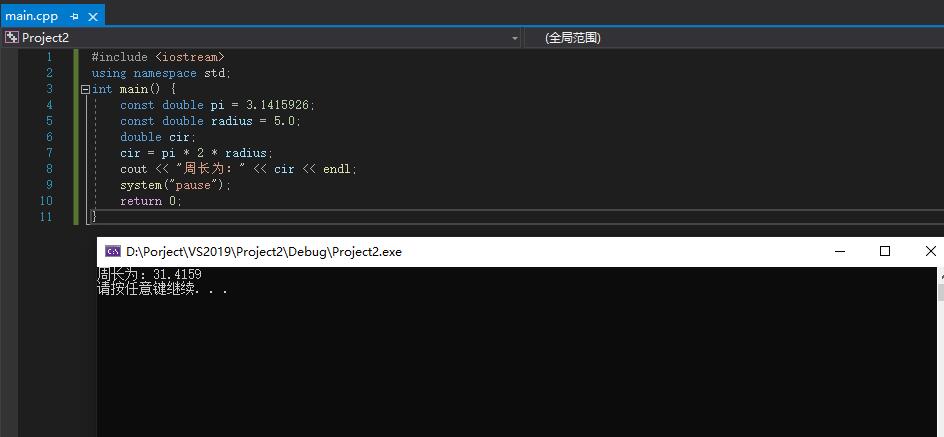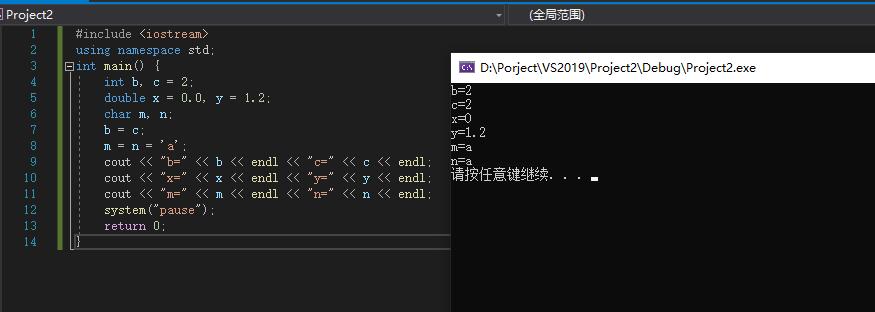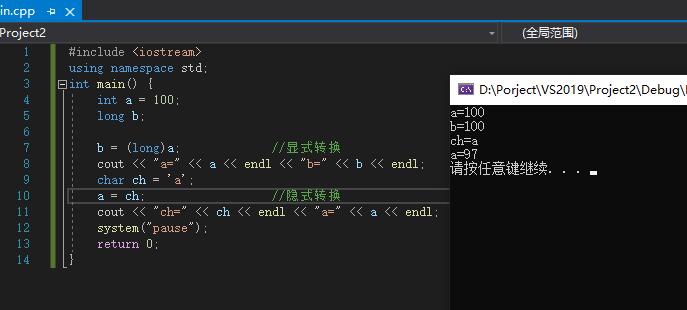1.1常量和变量
C++中数据分为常量与变量两大类。这两个名词很好理解,就是字面的意思。
1.1.1常量
分为三种:直接常量、符号常量和枚举常量。
直接常量就是常数,如‘123’ ‘4.56’ ‘a’ ‘&’ 等。
符号常量是指使用前需要生命的常量,一般用const来定义符号常量。
const <类型> <常量名> = <表达式>;
注意事项:
·定义常量必须以const开头。
·类型名为基本类型以及派生类型,可以省略。
·常量名为符合C++标识符命名规则的标识符。
·表达式应与常量类型一致。
例如:const float pi=3.1415926;
上一段程序来测试:
#include <iostream>
using namespace std;
int main(){
const double pi=3.1415926;
const double radius=5.0;
double cir;
cir=pi*2*radius;
cout<<"周长为:"<<cir<<endl;
system("pause");
return 0;
}
1.1.2 变量
简单的说,变量就是可以改变的量。用名字标明的一块内存,其中存储数据。变量名只能由字母、数字、下划线组成。
变量名也是一种标识符,标识符是对程序中实体名称的统称。这些实体包括:符号常量、枚举常量、变量、函数、类、结构体及模板等,命名规则相同。
一般变量命名按“前缀+对象描述”的顺序组合起来。
命名前缀符号表(匈牙利命名法)
| 前缀 | 数据类型 |
|---|---|
| c | 字符 |
| by | 字节 |
| n | 短整数和整数 |
| i | 整数 |
| b | 布尔型 |
| w | 无符号字 |
| l | 长整数 |
| dw | 无符号长整数 |
| fn | 函数指针 |
| s | 串 |
| sz | 以0为结束的字符串 |
| lp | 32位长整数指针 |
| h | 句柄 |
| msg | 消息 |
1.1.3变量的定义及赋值
[<存储类>] <类型名或类型定义> <变量名表>;
参数说明:
存储类(可缺省):
auto标识一次性存储,其存储空间可被若干变量多次覆盖使用;
register表示存放在通用寄存器上;
extern表示再所有函数和程序段中都可引用;
static表示在内存中以固定地址存放,在整个程序运行期间都有效;
类型名或类型定义值得是变量所属的数据类型;
变量名表是指声明变量的变量名称;
例:
#include <iostream>
using namespace std;
int main(){
int b,c=2;
double x=0.0,y=1.2;
char m,n;
b=c;
m=n='a';
cout<<"b="<<b<<endl<<"c="<<c<<endl;
cout<<"x="<<x<<endl<<"y="<<y<<endl;
cout<<"m="<<m<<endl<<"n="<<n<<endl;
system("pause");
return 0;
}
1.2基本数据类型
1.2.1基本数据类型
·整型:说明符位int。
·字符型:说明符位char。
·浮点型(实型):说明符位float(单精度)、double(双精度)。
·布尔型:属名符为bool(true or false)。
4中修饰符:signed 有符号 unsigned 无符号 long 长型 short 短型
c++基本数据类型表
| 数据类型 | 数据描述 | 占字节数 | 取值范围 |
|---|---|---|---|
| char | 字符型 | 1 | -128~127 |
| unsigned char | 无符号字符型 | 1 | 0~255 |
| signed char | 有符号字符型 | 1 | -128~127 |
| int | 整型 | 4 | -2^31~2^31-1 |
| unsigned[int] | 4 | 0~2^31-1 | |
| short[int] | 2 | -32768~32767 | |
| unsigned short[int] | 2 | 0~65535 | |
| unsigned long[int] | 4 | 0~2^31-1 | |
| singed logn[int] | 4 | -2^31~2^31-1 | |
| float | 单精度浮点型 | 4 | -3.4e38~3.4e38 |
| double | 双精度浮点型 | 8 | -1.7e308~1.7e308 |
| long double | 长双精度浮点型 | 10 | -1.1e4932~1.1e4932 |
| void | 无值型 | 0 | {} |
| bool | 逻辑型 | 1 | {false,true} |
1.3变量的作用域
声明的变量主要分为全局变量和局部变量,可以出现在程序的任何位置,在不同的位置声明,其作用域也不同
1.4类型的转换
1.4.1隐式转换
系统默认,不声明就可以转换
1.4.2显式转换
例:
#include <iostream>
using namespace std;
int main(){
int a=100;
long b;
b=(long)a; //显式转换
cout<<"a="<<a<<endl<<"b="<<b<<endl;
char ch = 'a';
a=ch; //隐式转换
cout<<"ch="<<ch<<endl<<"a="<<a<<endl;
system("pause");
return 0;
}
还不快抢沙发